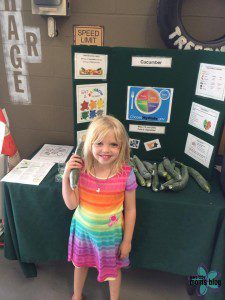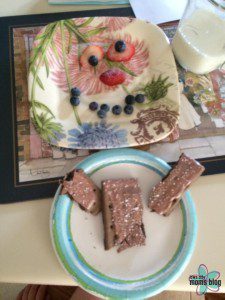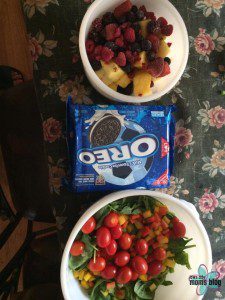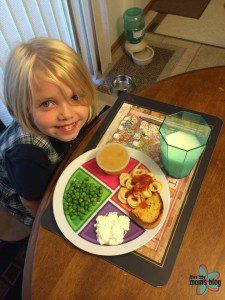I am a dietitian. A dietitian according to Webster’s Dictionary is defined as: “a person whose job is to give people advice about what to eat in order to be healthy.” I know just about everything you need to know about food and health. I keep up with the latest professional journal articles about the science of dietetics. I teach classes and attend seminars dedicated to the subject. I tell people how and why they should eat healthy and I make a part of my living by having earned the letters “RD” after my name.
I also finished off an entire sleeve of Girl Scout “Shortbread” cookies 30 minutes before writing this blog post. This was not a result of some monumental stress or even a day of slight annoyances. As a matter of fact, I had a relaxing day off of work with no obligations. The cookies joined me for three blissfully uninterrupted episodes of “Gilmore Girls.” It was one heck of a nice afternoon and the cookies were the pièce de résistance. But rest assured, this laissez faire attitude toward one of the seven deadly sins, (especially considering my education and profession) has not come easily to me. Food and my volatile relationship with it has been the backdrop to my life story for over 40 years.
I was a chubby kid growing up. I was always one of the heaviest kids in school until I sprouted up from about 5′ ft. 2” to 5′ ft. 9” the summer before entering 8th grade. I never got teased much growing up because of my weight (at least not that I noticed). I always had a great, albeit, small group of sweet girls that were my friends. Kids liked me for the most part. My childhood was nice enough, but I was an introverted, sensitive kid. I felt deeply and I hurt deeply. I knew I was chubby. I was smart enough to know that shopping in the “Husky” section at Sears when you are 10 years old was not the norm. I was aware that I was the fattest little girl in my ballet class. It bothered me at a young age. So I turned to junk food.
It was the 70’s and early 80’s. Health and nutrition was not at the forefront of anyone’s minds like it is today, at least not in the small, Midwestern town where I grew up. We had Jane Fonda and we had Richard Simmons and unfortunately for me, we had convenience stores close to my house where I could always buy some Hostess treats every day after school. I was a “latch-key” kid whose father had a “spare change” bowl that I was allowed to borrow from liberally. Access to junk food was not a problem for me and I ate a lot of it.
 It got me through my tumultuous teenage years where a boyfriend made me feel “less than,” a mom was diagnosed with breast cancer, and a beloved sister left me to get married. In a town where there was nothing to do, my friends and I would drive 45 minutes to a restaurant called “Oogies” just for the fried cheese balls. Food was sometimes something to comfort me and sometimes it was just something to do for fun. It was my friend. It was my very best friend… and then it left me. It has left me two times in my life. As a teenager I slipped into that common trap of dieting. I lost a lot of weight because my boyfriend at the time was cheating on me and of course at the age of 16 one could only deduce it was because I wasn’t “pretty enough,” a way of immature thinking that now, as a mother of a teenage girl, scares me to death. Although not a full-fledged eating disorder, I was certainly walking a fine line. But going away to college, new friends, a new confidence, new adventures, and new loves got me back in touch with my old BFF – food. It resumed its place as a normal accompaniment to my life. It maintained the typical ebb and flow of dopamine fixes due to stress, happiness, tiredness, or boredom.
It got me through my tumultuous teenage years where a boyfriend made me feel “less than,” a mom was diagnosed with breast cancer, and a beloved sister left me to get married. In a town where there was nothing to do, my friends and I would drive 45 minutes to a restaurant called “Oogies” just for the fried cheese balls. Food was sometimes something to comfort me and sometimes it was just something to do for fun. It was my friend. It was my very best friend… and then it left me. It has left me two times in my life. As a teenager I slipped into that common trap of dieting. I lost a lot of weight because my boyfriend at the time was cheating on me and of course at the age of 16 one could only deduce it was because I wasn’t “pretty enough,” a way of immature thinking that now, as a mother of a teenage girl, scares me to death. Although not a full-fledged eating disorder, I was certainly walking a fine line. But going away to college, new friends, a new confidence, new adventures, and new loves got me back in touch with my old BFF – food. It resumed its place as a normal accompaniment to my life. It maintained the typical ebb and flow of dopamine fixes due to stress, happiness, tiredness, or boredom.
The second time I decided to leave food behind was when I lost our son when I was 21 weeks pregnant. It’s a complicated story for another blog post, but the result was that instead of properly grieving, I focused all of my energy into getting in shape. I was never more thin and fit in my life. I was 30 lbs. lighter than I am now. I worked out twice a day and I watched everything I ate. By skewed societal standards I will never look that “good” again. I was also never more depressed, sick, sad, and lost.
But again, I pulled myself out of that phase and now consider myself to be in a pretty good place in my relationship with food. It has taken me a lot of trial and error, a formal education on the subject of nutrition, a loving family, and the maturity and self assurance that comes with age to achieve what most people refer to as “moderation.” What about my kids though? What do I teach and model for them on the subject? How do I help them develop a healthy relationship with food that took me 40 years to achieve? I don’t have all the answers and never will, but I do know that a good place to start is with a box of Pop-Tarts.
 Let me explain. I remember one morning I was off to teach a nutrition class and my youngest daughter asked me to make her breakfast “in a face.” (She likes her food to be personified). I gave her what little fruit we had, but it wasn’t enough for a good breakfast. I was stressed and in a hurry so I used a chocolate fudge Pop-Tart to round out the meal. I remember thinking to myself “For goodness sake, Anissa, you are on your way to teach a NUTRITION class. What on earth is the matter with you? You are such a failure not only as a dietitian but as a mother.” Looking back on that particular breakfast I realize now that it was actually a “Good Mommy Moment” not one for which to berate myself. I can still hear her giggling and saying, “Take a picture mommy! Take a picture!” It gave her joy. She started her day out happy and that feeling was created by me. I missed it at the time, though, and only remembered it recently when stumbling across the picture. I was too busy internally chastising myself then to notice what a great moment this was between the two of us. How many moments similar to that had I missed because of my preoccupation with food perfection? It breaks my heart to think about it.
Let me explain. I remember one morning I was off to teach a nutrition class and my youngest daughter asked me to make her breakfast “in a face.” (She likes her food to be personified). I gave her what little fruit we had, but it wasn’t enough for a good breakfast. I was stressed and in a hurry so I used a chocolate fudge Pop-Tart to round out the meal. I remember thinking to myself “For goodness sake, Anissa, you are on your way to teach a NUTRITION class. What on earth is the matter with you? You are such a failure not only as a dietitian but as a mother.” Looking back on that particular breakfast I realize now that it was actually a “Good Mommy Moment” not one for which to berate myself. I can still hear her giggling and saying, “Take a picture mommy! Take a picture!” It gave her joy. She started her day out happy and that feeling was created by me. I missed it at the time, though, and only remembered it recently when stumbling across the picture. I was too busy internally chastising myself then to notice what a great moment this was between the two of us. How many moments similar to that had I missed because of my preoccupation with food perfection? It breaks my heart to think about it.
 Like most of us, I hope that I am helping to foster a healthy relationship with food when it comes to my kids, but I also worry that they will inherit my life-long struggle with it. I try not to be critical of my body around my girls (I fail at this sometimes). I try to let them regulate what they eat through their own “likes” and “dislikes” and hunger cues (I fail at this sometimes too). I don’t discourage happy times that center around food like walking our dog to the frozen yogurt place after family dinner on nice summer nights or eating as many Oreo’s that they want out of the bag that their beloved grandpa brings them every time he visits.
Like most of us, I hope that I am helping to foster a healthy relationship with food when it comes to my kids, but I also worry that they will inherit my life-long struggle with it. I try not to be critical of my body around my girls (I fail at this sometimes). I try to let them regulate what they eat through their own “likes” and “dislikes” and hunger cues (I fail at this sometimes too). I don’t discourage happy times that center around food like walking our dog to the frozen yogurt place after family dinner on nice summer nights or eating as many Oreo’s that they want out of the bag that their beloved grandpa brings them every time he visits.
My eating habits are riddled with imperfections. My parenting skills are riddled with imperfections. My profession as a dietitian is riddled with imperfections. But just the same, I am going to end here with some advice. If you ever find yourself wanting to eat a sleeve of Girl Scout cookies while binge watching “Netflix” or giving your kid a chocolate Pop-Tart because you are just too tired, busy, or simply want to make them happy, I think it is ok. There is another food group besides the ones the Food and Drug Administration dictates to you (whole grains, dairy, protein, fruit, and vegetables). I call it the “Pop-Tart” group to remind me of that morning with my daughter. To me it encompasses all of the foods that evoke a memory of a loved one, or a special time in your life. It is the group comprised of the food that is consumed as a result of both triumphs and great losses. It is the food that represents friends, family, hard work, growth, celebration, tradition and maturity. It is the food group that you eat because it just happens to taste really, really, good. It is the food group that in all of its chocolaty, sugar-laden, preservative-filled, unhealthy, glory has the power to invoke pure joy in the form a little girl’s giggle. Eat it up, savor it, and bon appetite.











Anissa, I love this post. I help people have a healthy relationship with food, and there really is no “perfect” eating. The assumption that there is a perfection that you can achieve usually makes people feel worse and eat worse. And although food should not be a substitute for things like communication and dealing with your feelings, there is no reason to separate joy and fun from food. Even Pop Tarts.